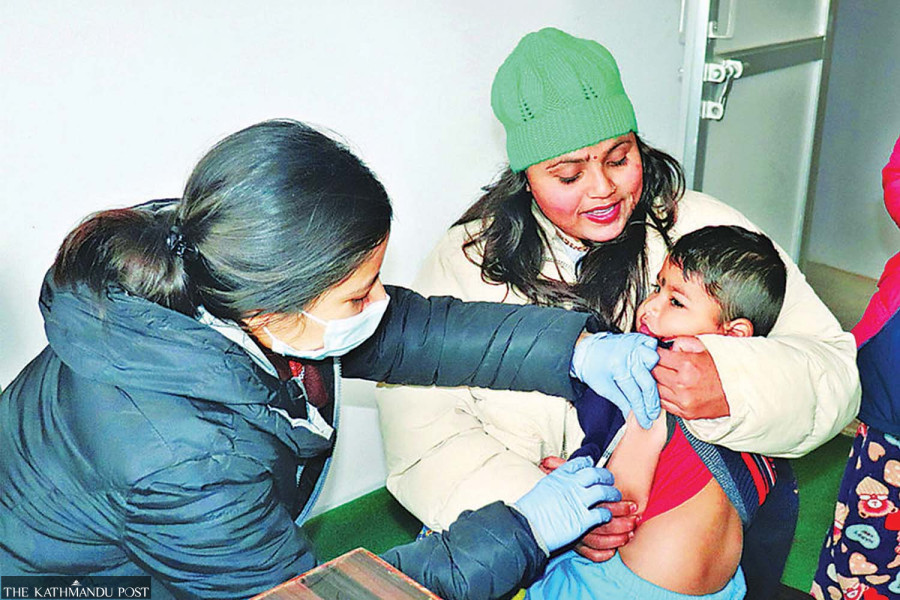Health
Madhesh to be declared fully immunised. Experts say it may backfire
Child health experts doubt claims that all eligible children in Madhesh have been administered the routine vaccines.
Arjun Poudel
In June last year, a measles outbreak was reported in Kathmandu’s Gokarneshwar Municipality. Along with Kathmandu of Bagmati Province, the outbreak of the deadly disease was reported in several districts of Lumbini, Karnali, Sudurpaschim, Koshi, and Madhesh provinces.
And in less than a year of that outbreak, health authorities concerned have been gearing up to declare the entire Madhesh Province fully immunised.
“We are all prepared to declare the Madhesh Province fully immunised,” said Dr Abhiyan Gautam, chief of the Immunisation Section at the Family Welfare Division under the Department of Health Services. “All the districts of Madhesh Province have been already declared fully covered, and we have decided to declare the province fully immunised.”
To declare an area as fully immunised, all children under 15 months old residing there must be administered all vaccines of the routine immunisation programme.
Child health experts doubt the claim that all eligible children of the Madhesh Province have been administered the routine vaccines. They say the decision to declare a fully immunised province could raise a sense of complacency in the public, which will ultimately backfire.
“Most of the districts across the country have already been declared fully immunised, and the fact is outbreaks of vaccine-preventable diseases, including measles, keep getting reported,” said Dr Shyam Raj Upreti, former director general at the Department of Health Services. “Declaration of a fully immunised province could create a sense of complacency in the public. We also declared the entire country open-defecation-free years ago, but outbreaks of waterborne diseases, including diarrhoea and cholera, have not stopped.”
Experts say many districts across the country have already been declared fully literate but it’s hard to believe that all the districts are indeed fully literate.
“For the last four months, we have been launching extensive vaccination programmes to achieve the target of a fully immunised province,” said Dr Rajiv Jha, chief of the Provincial Health Directorate of Madhesh Province. “We have also carried out the survey and found 100 percent of children between 15 to 23 months are immunised.”
Experts, however, say it is impossible to achieve fully immunised status, as babies are born every hour and every day. Coverage of most health programmes is low in Madhesh Province compared to districts of other provinces. People of certain communities go to maternal homes for child delivery and return months after, and the risk of missing the routine vaccination is high there, according to them.
Vaccine coverage is low among people living along the Nepal-India border who keep travelling to India frequently. Most of them opt out of vaccine programmes run by both Nepal and India. Health experts say low vaccination coverage, internal migration, a lack of awareness of importance of vaccines, and government apathy are among the reasons for regular outbreaks of vaccine-preventable diseases.
“Due to cross border movements, the trend to go to maternal homes for child delivery, lack of awareness about the importance of vaccination and hygiene and sanitation conditions, risk of children missing routine vaccines is high in Madhesh Province,” said Upreti. “More than the declaration of full immunisation, sustaining that status is very crucial. Childhood vaccination is a continuous process, which never ends, meaning that the target is never achieved.”
The Nepal Demographic and Health Survey-2022, carried out by the Ministry of Health and Population, showed that at least four percent of children aged 12 to 23 months have received no vaccination.
The number of children missing basic antigens in the routine immunisation programme in Madhesh Province was also staggering. According to the report, the immunisation coverage rate in Madhesh Province is only 68 percent, which means 32 percent of children in the province didn’t take all the vaccines. It is the lowest of all the seven provinces.
The government provides 13 types of vaccines through the national immunisation programme. Gandaki Province has a 93 percent vaccine coverage rate, the highest in the country. The vaccine coverage in Sudurpaschim Province, which is considered less developed and less educated, is 89 percent.
The vaccination coverage rate is 81 percent in Koshi, 83 percent in Bagmati, 85 percent in Lumbini, and 84 percent in Karnali Province.
Immunisation is considered the most cost-effective and efficient way to control and eliminate vaccine-preventable diseases that contribute to childhood illnesses and deaths.




 14.12°C Kathmandu
14.12°C Kathmandu















